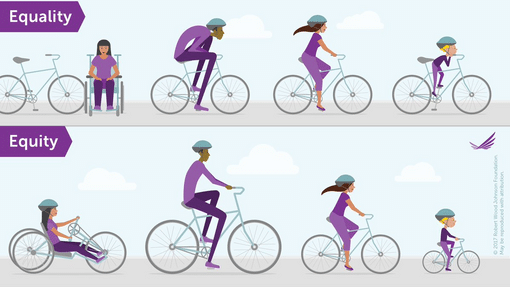
Action for equity: why equal opportunities aren't enough
Contents
- Equality versus Equity: What’s the difference?
- How can employers move to place equity at the heart of their inclusion journeys?
- #1 Understand gaps in employment and career breaks
- #2 Don’t use spelling and grammar mistakes as a primary reason to reject a CV
- #3 Role model, elevate and celebrate
- #4 Put words into action
- #5 And finally… Encourage employee feedback and engagement
Contents
The theme of International Women’s Day in 2023 was #EmbraceEquity to get the world talking about why equal opportunities aren’t enough. Workplace equity is the concept of providing fair opportunities for all employees and candidates based on their individual needs. We explore how employers can change the conversation from equal opportunities, which can often be exclusionary to equitable opportunities which hold true inclusivity at its core.

Equality versus Equity: What’s the difference?
The words equity and equality are often used interchangeably. Yet, equity and equality are inherently different concepts and equality can in fact be exclusionary, rather than inclusive.
Equality refers to treating everyone the same, regardless of their specific circumstances or needs. It assumes that every individual should be given the same resources and opportunities, regardless of their background or personal circumstances.
Equity, on the other hand, means acknowledging and addressing the disparities that exist between different groups of people based on factors such as race, gender, social class, and ability. It requires taking into account the unique challenges and needs of each group and providing them with the necessary resources and support to overcome those challenges and achieve success.
In summary, while equality focuses on equal treatment for all, equity seeks to address the underlying reasons for inequality and ensure that everyone has an equal chance to succeed.

How can employers move to place equity at the heart of their inclusion journeys?
We believe that we should #embraceequity not just for one day, but every day. Workplace equity is the concept of providing fair opportunities for all employees and candidates based on their individual needs.
Here are 5 tips to consider whether you’re starting an inclusion journey, are motivated to make changes or are well on the way to turning the dial in creating true equity in your organisation:
#1 Understand gaps in employment and career breaks
Many people can feel concerned about the impact that ‘time out’ will have on their career. Be positive about parents who want to, or have, taken time out for family. Likewise appreciate those who have taken a career break to train, travel, care for relatives or simply make time for themselves or others - these experiences will only make for well-rounded, conscientious employees or candidates.
#2 Don’t use spelling and grammar mistakes as a primary reason to reject a CV
Are you still using spelling mistakes, grammar, CV formatting and inconsistent use of full stops to reject candidates? You could be missing out on so many great people. Naturally, it depends on the requirements for the role, but if hiring managers are using this as a primary CV-sifting tool it can create an unnecessary barrier to employment for dyslexic and other neurodivergent candidates.
Candidates, if you are on the job search and concerned about spelling and grammar, free tools like Grammarly can be a huge help.
#3 Role model, elevate and celebrate
Foster a culture of inclusivity by making sure that all employees feel valued and respected, regardless of their race, gender, sexual orientation, or any other characteristic. You can’t be what you can’t see so ensure you’re visibly championing diversity within your organisation; introduce mentoring, celebrate success, and promote without prejudice. Aware you need more diversity in your workplace? Think about succession planning, training, attraction strategies and workplace culture.
#4 Put words into action
From equal pay, menopause leave and flexible working to assessing whether bank holidays are inclusive for everyone employers should conduct regular assessments to identify areas of improvement and put policies in place that support people from all demographics. Assessments can help employers understand where they need to focus their efforts to create a more equitable workplace, and can inform the development of targeted strategies and initiatives.
#5 And finally… Encourage employee feedback and engagement
This can include conducting regular surveys or focus groups to gather feedback from employees and actively listening to their concerns and suggestions. Employers should also provide opportunities for employees to be involved in decision-making processes and take ownership of DEI initiatives.
Action for equity is never done, give your people the tools they need to succeed. By embracing equity, companies can create a more inclusive environment where employees feel valued and supported, which can ultimately lead to increased productivity, innovation, and employee retention.
One key reason why companies should embrace equity is that it can help to reduce discrimination and promote diversity in the workplace. When employees feel that they are being treated fairly and equally, regardless of their background, they are more likely to feel comfortable sharing their ideas and perspectives. This can lead to a wider range of viewpoints being considered, which can in turn lead to more creative solutions to problems and better decision-making.
In addition to promoting diversity and reducing discrimination, embracing equity can also help companies to attract and retain top talent. In today’s competitive job market, employees are looking for companies that value their contributions and treat them with respect. By creating a culture of equity, companies can set themselves apart from their competitors and build a reputation as an employer of choice.
Ultimately, embracing equity is not just the right thing to do from a moral standpoint; it is also good for business. By creating a more inclusive and supportive workplace culture, companies can drive innovation, increase productivity, and attract and retain top talent.
Curious about diversity? We have further reading for you.
Check out our latest guide to ‘Embrace every kind of mind: a guide to creating neuro-inclusive working environments’
Contents
- Equality versus Equity: What’s the difference?
- How can employers move to place equity at the heart of their inclusion journeys?
- #1 Understand gaps in employment and career breaks
- #2 Don’t use spelling and grammar mistakes as a primary reason to reject a CV
- #3 Role model, elevate and celebrate
- #4 Put words into action
- #5 And finally… Encourage employee feedback and engagement















